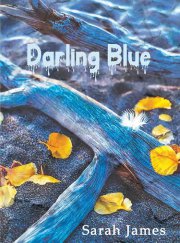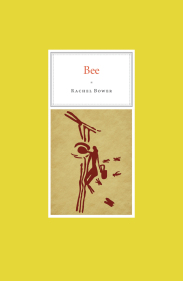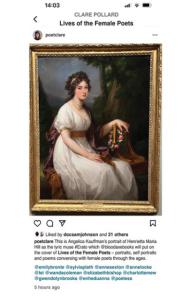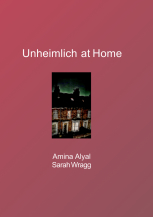
2017
OCTOBER CONTRIBUTORS
Joe Balaz, Chinua Ezenwa-Ohaeto, Susan Sweetland Garay, Maximilian Heinegg,
Deirdre Hines, Devon Marsh, Paul McDonald, Richard Merelman, Gillian Prew,
Jill Talbot, Sarah White.
JOE BALAZ
Lesson in Science
Da round yellow eye
wuz as big as wun dinner plate
in da head of wun huge alien serpent—
Looks like we are not alone.
Da legion of hairless monkeys back home
are in foa wun surprise
cause we just got wun jolt
of cosmic commonality
from da rest of da universe.
I taught it wuz amazing
wen I saw da Great Red Spot up close
but now my heartbeat
has raced to da finish line
as da answer
to da momentous question of adah life
is now swimming around me in circles.
Inside my luminous suit
beneath wun foreign sea
I move in strange currents
and view wat humankind has dreamed about.
Wats even moa fascinating
is dat it’s right heah
in our own backyard
twirling around da same sun.
Europa
has offered up its ocean secrets
and I’m basking in da glow
of sudden insight.
It’s as startling
as two eyelids opening
to da pouring in of daylight.
Discovery is wheah you find it
and da instructor
standing deah before me
is going to attest to dat.
He wacked my desk
wit wun ruler
to get my attention.
I wuzn’t really napping—
I wuz just taking
his possible life on adah planets lecture
further den he could even imagine.
Joe Balaz writes in Hawaiian Islands Pidgin (Hawai'i Creole English) and in American English.
Some of his recent Pidgin writing has appeared in Heavy Feather Review, Public Pool,
The Rising Phoenix Review, and Unlikely Stories Mark V, among others. Balaz is an avid supporter
of Hawaiian Islands Pidgin writing in the expanding context of World Literature. He presently
lives in Cleveland, Ohio.
Back to POETRY ARCHIVE
CHINUA EZENWA-OHAETO
The Teenager Who Became My Mother
The teenager who became my mother
had a way of feeling, seeing and hoping.
It was her hope that
rafted us through the war.
She was not one eyed,
her hairs were strands
of broken happiness and loneliness.
Each of the scars at her back was a memory.
Her inside was patient as hope.
She had a black painted skin
that shimmers as coal and ruin.
When I asked if she had
seen anyone die during the war,
she moved her head up and down.
She said that she saw five, twenty, even more;
that most of them drowned inside of her.
I looked into her eyes
after she had exhausted her dying tales before me,
I saw the teenager who became my mother:
she was a graveyard of those who drowned
inside of her to see us crawl through the war.
Chinua Ezenwa-Ohaeto studied English Language and Literature at Nnamdi Azikiwe University, Awka, Nigeria. His works have won Association of Nigerian Author’s Literary Award For Mazariyya Ana Teen Poetry Prize, 2009; National Association Of Students Of English Language and Literary Studies best student poet and the winner of Speak to the heart inc. Poetry contest, 2016. He has published his works in journals, magazines and blogs.
Back to POETRY ARCHIVE
SUSAN SWEETLAND GARAY
Unearth
Once
I went into a
rocky cave
carpeted
in green.
It was dark
and damp and
time sped up there.
We all feel lost sometimes
but the road is before us
and none of us want to stand still.
I think I write to
uncover the maps
I know are all around me,
to unearth what is already there.
It’s June now and suddenly
everything seems
to be opening.
Susan Sweetland Garay lives in rural Oregon and loves time spent in the natural world. She was nominated for a Pushcart Prize in 2014. Her first full length poetry collection, Approximate Tuesday, was published in 2013 and her second book Strange Beauty was published in 2015.
Back to POETRY ARCHIVE
MAXIMILIAN HEINEGG
Ms.
They say they fire up joints in the back row,
that on the first floor you can hear the books
fall from her window where they're casting
ballots against the teachers’ union.
They say she reads the Oedipus cycle
aloud, that one by one the heads drop
to the desk like leaves, after Colonus
her soft analysis is the coup de grace.
They say she taught the grandparents,
the parents, & now they funnel
her the ne'er do wells, lowering the last
hurdle to let them finish the race.
They say her charges turn a pass for water
into a jaunt down the halls of C building,
that you can hear them rattle the lockers
sounding lost as they call after girls.
Yet everyone wants to know if she's still there.
When they hear she is, not a syllable sinister,
& last year, when she fell on her way in,
the children shuddered for her bones.
She was back the next day, pulling her cart
of books & papers, to her room in this castle
on the hill that they say was built by a man
who perfected prisons in California.
Waiting for
Bono
When Kevin the carpenter told Simon of Cork
he’d heard from a friend who worked security
for The Lads when they came through town
that we might see Bono at arm’s length
we were off, Simon’s sedan peeling
down Playstead to Davis Square
to admire the doorway in the Burren’s back-room.
It was as fair a chance as any, a night off
for the band between a stand in the Garden-
a habit of theirs, to thrill lucky punters
& my wife said, what if you don’t go & they do?
One said Unlikely
they'd pass this way, a publican's ruse,
confiding that Bono, that merchant of justice
was nursing a broken arm from a busted affair,
Bicycle accident? Load of shite-
so we stood for hours, gents
trading pints, the opening call of “the Miracle
of Joey Ramone” led by Kevin, who’d seen him
twenty times, from North of the neck
of Ireland to Gillette.
& All night we kept our eyes on the backstage rope,
keeping us from no one but the bouncer
who stood at attention, careful enough
to preserve the possibility of the imminent
performance, while the barmen struggled to keep up.
Though Bono was a no-show, it didn't matter,
I was lucky as a man off his leash, as the speaker streamed
the hits & the crowd sang each line, from the feminist
nod of on your knees, boy in “Mysterious Ways,” to the taste
of empathy in “Sunday Bloody Sunday,” sung
just the way the crowd does on the arena’s floor, full-
throated, shoulder to shoulder with strangers in beers & joints,
the faithful glowing phones proof of assent & attendance.
We'd find him later, maybe next summer, when we heard
he might make his way back through town.
Maximilian Heinegg's poems have appeared in The Cortland Review, December Magazine, Tar River Poetry, Crab Creek Review, and Columbia Poetry Review, among others. He lives and teaches English in Medford, MA, where he is also the co-founder and brewmaster of Medford Brewing Company.
Back to POETRY ARCHIVE
DEIRDRE HINES
Red Flying Saucer Caught on Camera Above Cafe Florence, Letterkenny, County Donegal.
It was on the last Thursday of the wettest
or the driest July on record-
This may or may not have had some sort
of numerological significance,
of a kind Meteorological Eire
no longer used in their forecasts,
having sent the Magi into eternal retirement
on the advice of Government Directive 101.
Nevertheless
There had been definite signs and omens
that anyone with an ounce of wit
would not have missed-
But since when were wit and sense
deemed necessary
in these days of plastic currency?
On the one hand
The Gallagher hens were laying late,
The waters of the Swilly were runnning wrong,
Japanese Knotweed had the run of the ground-
No cause for ESB blackouts could be found.
Five hundred empty houses lay fallow
As nurses from the psych unit followed
after the homeless sick in the hollows
of the shadows cast by fat bellied wallahs.
But on the other hand
Five hundred met their twin flames in dreams
described in viral Facebook streams.
Many who heard their names repeated
in unexpected places were compelled
to google ' Fogotten Truths Revealed'-
That night
as poets spoke at the Open Mic
of moments of truth that gave them pause,
A hound and his man stand outside looking
up at a hovering disc in the red night sky
and he is brought to mind of that painting
by Ghirlandio of 'The Madonna with Saint Giovannio'
the saint his grandmother named him after
and he saw hanging in a Florence gallery
and of how histories will haunt until
the truth of every Truth illumines another
light on the other side of the shepherd's story.
Deirdre Hines is an award-winning poet and playwright. Her first book of poetry The Language of Coats was published by New Island Books. It includes the poems that won The Listowel Poetry Collection 2011. New poems have been published in The Bombay Review, Abridged, Boyne Berries, The Lake and Three Drops from a Cauldron to name a few. Her website is www.deirdrehines.com amd she blogs on poetry at www.alllanguageisastoryofforestblogspot.ie She reviews poetry for Sabotage.
Back to POETRY ARCHIVE
DEVON MARSH
She Does Not Make Sea Level Rise
As big as Delaware it came up
in dinner conversation unexpected,
the way it broke from Antarctica.
My son had listened to the same
report I’d heard that explained
how the berg, already afloat
when it cleaved, would not affect
sea level, though it held back glaciers
that would if they slid into the sea.
I listened to the story while driving
across town to visit my mother,
taking an indirect route just to see
old neighborhoods, the church where
my kids attended preschool, the paved
trail where they first rode bicycles.
My parents moved to be near us. Now
my mother drifts daily through wide halls
to the dining room, weekly to the hairdresser,
back to her apartment, her television,
her telephone, tele being Greek
for “at a distance,” like the callers’
voices she would love to hear. They float
far away on swells and troughs in an ocean
of their own making. My mother asks
the same questions over and over.
Her community feels like a group of refugees
from an archipelago of half-sunken towns
with schools, churches, pharmacies. Parks
with blue pools. And around the parks,
quiet roads where they taught my generation
to ride bikes, then to drive. Roads we followed
out onto ice the size of a state, our being
done with islands, unconcerned with melt.
Devon Marsh served as a naval aviator and now works as a risk manager for Wells Fargo Bank. His poetry has appeared in The Lake,Poydras Review, Muddy River Review, Penmen Review, Loch Raven Review, The Kakalak
Back to POETRY ARCHIVE
PAUL MCDONALD
Manet’s Olympia
Whose idea was the kicked-off slipper,
bootlace necklace? Yours of course,
Victorine, nude on the unmade bed.
Your maid’s a flower bearer, a breast of blooms
fresh from your admirer. You should have heard
the scoundrel joke as he passed them on.
He’ll be here anon, hence the cat’s arched back;
she’d shapeshift to the shadows if she could find some.
Your skin craves light, rejects halftones
to glare like wild teeth, no half measures
for your mismatched eyes, forthright stare.
But I can only wonder how you know I’m there?
Paul McDonald runs the creative writing programme at the University of Wolverhampton, England, and is a poet, novelist, and critic. His publications here
Back to POETRY ARCHIVE
RICHARD MERELMAN
My Favorite Things
after Rogers and Hammerstein
Fred, the man in the bed across from me,
begins to die. I can tell
from the nurses rushing in
and by their speed finishing up and drawing
a blue curtain around him and
by the smell of his fear. We were admitted
together. I get better, and
he gets worse. Go figure.
For a while before he was too sick, Fred and I
would talk jazz. Fred saw
Coltrane live at Birdland, playing a long version
of My Favorite Things in
waltz time and hard bop,
ending with his patented sheets of sound.
I told Fred I liked the tune
with lyrics. So now our room is finally silent,
and I start to hum the melody
softly, not to bother anyone,
just loud enough, I hope, for Fred to pick it up.
I can’t imagine why I add
raindrops on roses, bright copper kettles, warm
woolen mittens, girls in white
dresses. I even scat a chorus.
From behind the curtain comes a metallic tap tap tap,
tap tap tap. By dawn, Fred is gone.
Some Hiroshimas
We cursed the stink bombs that fell
from the trees on our route to Cole Elementary.
The pulp cloaked the street, like the puke
we’d spewed on our bibs when we were little.
Stink bombs were vomitous, squishy,
viscous. The smell clung to our clothes.
Why bomb? The year was 1945;
a gigantic weapon had just erased
two Japanese cities. Posters in hallways
portrayed the Japs as beyond bad.
No one told us the tree was named
ginkgo, prized in Japan for its leaves
whose petals resemble a geisha’s fan.
Roasted seeds of the female gingko
flavored the tea in pleasure houses
before the War. Ginkgos are living
fossils, whose timelessness perhaps implied
a superior destiny for the Empire of the Sun.
Hiroshima finished that. Four ginkgos
survived the blast…the only breathing
plants. Bearers of hope they were called.
Do students at Senda Elementary
in Hiroshima complain of nausea
when the nearest ginkgo sheds its fruit?
Do their teachers speak of that day in 1945
and tell them a smell cannot speak for itself?
Richard Merelman taught political science at the University of Wisconsin, Madison (USA) for most of his academic career. He published his first volume of poems, The Imaginary Baritone (Fireweed Press) in 2012, and a chapbook, The Unnamed Continent, (Finishing Line Press) in 2016. Individual poems have appeared in a range of journals.
Back to POETRY ARCHIVE
GILLIAN PREW
your verb is all water and light
an oil slick of colours all wind and spindrift
a kaleidoscope
not meat
or a sheep's fleece hung out, steaming/ not something a man kills
you do
like a liquid prism
good grief
you are wild
a brave beam of broken
I feel my heart crimson - beat
by beat it composes a bursting –
the lochside is hurting
a heron calls like a king/ raises his wings like a cloak of rain
his feet still rooted to the shallows
your thrill of colour makes no sound/
you pass quiet as a cloud
into light and water
I will have you Instagrammed soon
Born Stirling, Scotland in 1966, Gillian Prew studied Philosophy at the University of Glasgow from 1984 to 1988. Her latest chapbook, Three Colours Grief, was published by erbacce-press in June 2016. She can be found online at https://gprew.wordpress.com/
Back to POETRY ARCHIVE
JILL TALBOT
Daddy Warbucks for Sylvia Plath
Catholics love fairy tales; innocent
As candles waiting for fire.
Daddy Warbucks, here is one for you.
Daddy, I have had to kill you
With a smile and a curtsy
And a how do you do?
With your box sawed in two.
An engine, an engine,
Getting ready for the party. Alice,
Tiny Tim, Virgin Mary, all invited, all set
To bow down—The tiramisu
Is to die for—You see, I’ve done it again.
But oh, I loved some version of you—
His name was Nick, he had a thing for orphans.
And I did exactly as you taught me to do.
But they pulled me out of the sack,
And with each needle prick we were back
On the same set I always knew
Would come true. With my better half
And a love of the rack and the screw.
I stole this poem from Sylvia Plath.
I’ve been praying to her ghost to heal you.
In the ICU a spider said, But he is not you.
You stand at the blackboard, daddy,
Keeping score with chalk and onions.
You took my potatoes straight from the source.
Your English heart and my Irish hair—
An eye for an eye, a baby for a wand.
Adoption papers signed. The king will never
Banish you. Never asking if I want seconds
But a brother will do.
If I’ve killed one man, I’ve killed two—
My other daddy never existed, gone
Before I found you. All knowing the shape
Of a wishbone thrown into the fire. Ach, du—
There’s a stake in your fat black heart
And the villagers all adored you.
They are waiting for me to kill Sylvia.
To serve you back the heart on the platter.
You sneeze, they crumble, God bless you!
Daddy, daddy, I will never say I do—
I will eat my potatoes until England crumbles
And the king says, You do not do.
Jill Talbot attended Simon Fraser University for psychology before pursing her passion for writing. Jill has appeared in Geist, Rattle, Poetry Is Dead, The Puritan, Matrix, subTerrain, The Tishman Review, The Cardiff Review and is forthcoming in PRISM. Jill won the PRISM Grouse Grind Lit Prize and 3rd place for the Geist Short Long-Distance Contest. She was shortlisted for the Matrix Lit POP Award for fiction and the Malahat Far Horizons Award for poetry. Jill lives on Gabriola Island, BC.
Back to POETRY ARCHIVE
ANGELA TOPPING
The Five Petals of Elderflower
With the odd number five strange nature’s laws
Plays many freaks nor once mistakes the cause.
John Clare
I
Enter through its centre of five petals
past the crown of stamens like matches
slide down the green stem, landing with legs
either side of the junction between stalks.
Now you are surrounded by flowers.
Soak up the hum – you are at one with lace.
Sleep now, as in fresh sheets, soothed
by the sun, head in blossom, a perfumed lullaby,
leaves far below to catch you if you fall.
But you will not fall: the petioles enmesh.
Your cheek is on your mother’s breast,
the flowers are sweet milk. Rock-a-bye.
II
This tree is elder. It’s safe. With the blossoms
we can make elderflower champagne
with the berries, elderberry wine.
Put your nose into it. Yes, it’s a good scent.
If it smells like cat’s pee, so will your champagne.
So we don’t pick those. This tree is fine.
Hold this bag open while I cut some.
We don’t want to drop any –
see how easily each flower head can come away.
There’s lots of stories about this tree. Some say
it’s Faerie, but your mum knows more about that.
I say it’s very good to use. But we mustn’t
take all the blooms from one tree or there’ll be
no berries, neither for us nor birds.
III
The smell is buzzing in my head, as we walk
down the night lane, away from the heated air
of the pub where friends spilled onto the car park.
We whisper as we pass sleeping cottages –
can’t even see the elder, just smell it, as the lane
becomes a funnel of scents and fuzzy leaves.
I’m giddy, stumbling; now there is no-one to see
you take my hand. We cannot even see each other.
The flowers smell of sex, of lust, foreign tongues to us.
Too soon the lane opens out into streetlights,
pavements, cars. You drop my hand. The scent
is left behind, pollened on memory.
IV
Elderflowers sing jazz, each petalled phrase
plays another variation on the last.
Its saxophone voice rises above twanged strings
of cello and double bass, holding the melody
as it flies high. Notes dance round our feet:
we wade in sound. It’s a five bar blues,
scrolls of baroque, rising like smoke, tasting champagne.
White is not white, is green and cream and ivory.
And it sings the blues.
V
By its five textures: the rough underside of leaves
and the smooth front, the strong stem, thinner wands
of stalks, and cobbly lace of blossom like slubbed silk.
By its green taste, its umbrella canopy,
by the cushion of blooms each with five petals.
By these things, I swear to remember you.
“The Five Petals of Elderflower” is the title poem from Angela Topping’s book, reviewed in this month’s issue.
Back to POETRY ARCHIVE
SARAH WHITE
The True Scandal of the Magdelene
for Madeline Artenberg
A friend is reading me her poem
about Mary of Magdala, whose clandestine union
with the Christian Messiah, though a juicy item,
intrigues me less than the question
of Mary’s name and what became of it: An Oxford college
lists itself as Magdelen (pronounced Maudlen).
No one speaks of Mary Maudlen, but there is maudlin
to describe a work of art displaying sentiment
out of proportion with the situation.
Neither the college nor the region explain the connection,
only the image of Mary—weeping
at the Crucifixion, at the Tomb, and, later, in the throes
of Penitence. Europe’s artists—Donatello, Titian,
de la Tour—have glutted her with sorrow
and regret, a maudlin person, not the strong,
orgasmic heroine of Madeline’s poem.
If Mary wept, so what? Should a woman in tears—
no matter why or when—forever be open to opprobrium?
If maudlin must be in the dictionary, let it rarely
be assigned to persons, paintings, songs, or poems. Amen.
A review of Sarah White’s most recent collection, to one who bends my time, features in this issue of The Lake. She lives in New York City.
Back to POETRY ARCHIVE



